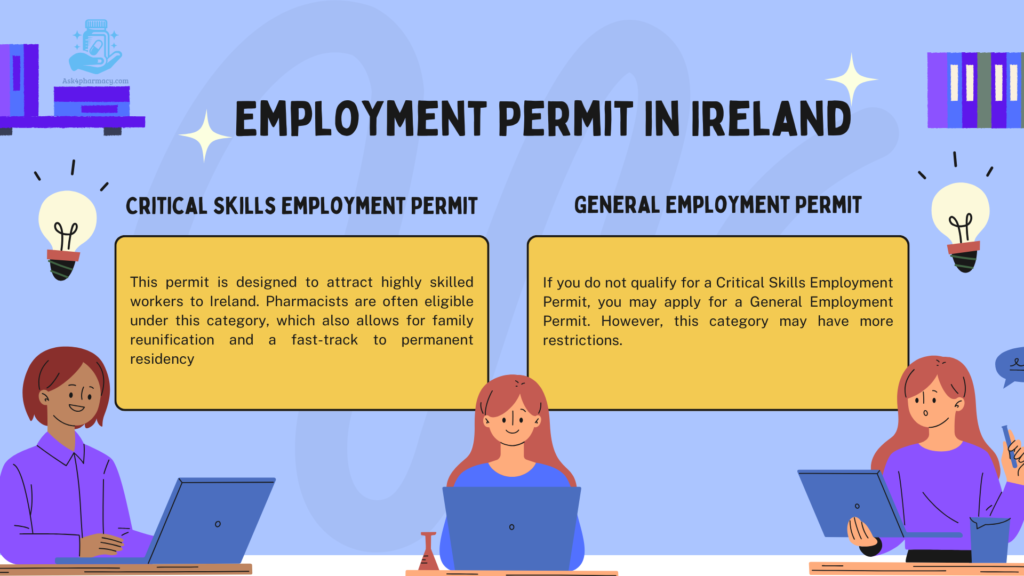How To Become A Pharmacist In Ireland
Working as a pharmacist in Ireland has excellent benefits, including competitive salaries, strong job demand, and opportunities for career advancement in retail, hospital, and pharmaceutical industry. Pharmacists also enjoy meaningful work, contributing to patient care and public health

To immigrate and work as a pharmacist in Ireland, you will need to meet specific professional and immigration requirements. Here’s a detailed guide on how to go about it:
1. Educational Requirements
- Pharmacy Degree: You must hold a recognized pharmacy degree that is equivalent to an Irish qualification. If you earned your degree outside of Ireland, your qualifications must be assessed for equivalency.
- Pharmaceutical Society of Ireland (PSI): The PSI is the regulatory body for pharmacists in Ireland. You will need to have your qualifications recognized by the PSI before you can practice.

2. Registration with the Pharmaceutical Society of Ireland (PSI)
- Qualification Recognition: If you are an internationally trained pharmacist, you must apply to the PSI for recognition of your qualifications. The process involves a detailed assessment of your educational background and professional experience.
- Adaptation Period or Aptitude Test: If your qualifications are not fully recognized, you may be required to complete an adaptation period (a supervised practice) or pass an aptitude test to demonstrate your competence.
- Pre-Registration Examination System (PRES): Depending on your background, you may also need to complete the PSI’s Pre-Registration Examination System. This assessment ensures that your knowledge and skills meet the standards required to practice in Ireland.
- Language Proficiency: You must demonstrate proficiency in English. The IELTS or OET (Occupational English Test) are commonly accepted language tests.
3. Immigration Requirements
- Employment Permit: To work in Ireland as a non-EU/EEA pharmacist, you will need an employment permit. The most relevant permits for pharmacists are the Critical Skills Employment Permit and the General Employment Permit.

- Job Offer: You must have a job offer from an employer in Ireland before you can apply for an employment permit. The employer must be registered and approved by the Department of Enterprise, Trade and Employment.
4. Finding Employment
- Job Search: Research and apply for pharmacist positions in Ireland. Job search websites, recruitment agencies, and professional networks can be valuable resources.
- Networking: Engage with Irish pharmacists, join professional associations such as the Irish Pharmacy Union (IPU), and participate in industry events to increase your chances of finding employment.

5. Adapting to Irish Pharmacy Practice
- Cultural Adaptation: Familiarize yourself with the Irish healthcare system, pharmacy regulations, and professional standards. Understanding these differences will help you integrate more smoothly into your role.
- Continuing Professional Development (CPD): After registration, you must participate in ongoing CPD to maintain your registration with the PSI. This involves regularly updating your skills and knowledge.
6. Support and Resources
- Pharmaceutical Society of Ireland (PSI): The PSI provides comprehensive information on the registration process for international pharmacists and can guide you through the steps you need to take.
- Irish Naturalization and Immigration Service (INIS): INIS provides detailed information on visa and employment permit requirements for working in Ireland.
- Irish Pharmacy Union (IPU): The IPU offers support and resources for pharmacists working in Ireland, including those trained internationally.
Discover More Ask4pharmacy
About Pharmacist About Pharmacy Free Courses Pharmacist in Usa Work As Phramacist
Thanks for your information
What is the average salary of a pharmacist in Ireland??
Thanks for your Commend,
The average salary for a pharmacist in Ireland varies based on factors such as experience, location, and specific role within the pharmacy sector. Generally, pharmacists earn between €60,000 and €75,000 per year.